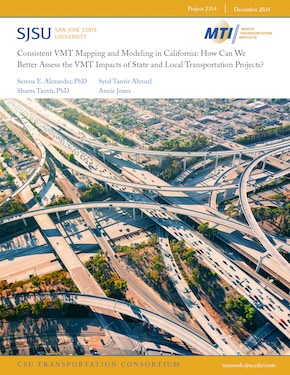- 408-924-7560
- mineta-institute@sjsu.edu
- Donate
Consistent VMT Mapping and Modeling in California: How Can We Better Assess the VMT Impacts of State and Local Transportation Projects?
Despite California’s ambitious target to achieve carbon neutrality by 2045, the state is not reducing greenhouse gas (GHG) emissions from personal vehicle travel, and per capita Vehicle Miles Traveled (VMT) and GHG emissions continue to increase. One central challenge of climate planning facing California is the lack of consistent methods to measure the VMT impacts of transportation projects. Using both qualitative and quantitative data, this research answers the question: “What are the advantages and limitations of existing VMT calculators to determine the climate impacts of transportation projects to help meet California’s climate goals?” Research methods included:
- A quantitative analysis of the existing VMT tools in practice, particularly in California, by identifying and analyzing the attributes of each tool and clustering the tools into distinct methods based on their similarities in principles, inputs, and outputs; and
- A qualitative analysis of perspectives of transportation professionals regarding VMT as a metric and VMT tools.
Findings indicate that the consistency, contextual relevance, complexity, data accuracy, and user-friendliness of the VMT tools vary significantly based on their design and methodology, and each tool presents a set of limitations and advantages, making it suitable for a specific use or context but not necessarily for another. Recommendations for the state include the following:
- Improve access to accurate, validated data for creating and inputting into VMT models and tools;
- Help create context-sensitive VMT tools capable of capturing local context and change over time;
- Strengthen dialogue between jurisdictions to share information and tools; and
- Encourage using an integrated approach to VMT analysis—which often combines the use of different tools and datasets for various stages of decision-making and scenario planning.
VMT tools help planners and policymakers estimate VMT and understand the impacts of transportation projects and policies. By improving our understanding of these tools and their advantages and disadvantages, we can choose the best tool for the specific need, ensuring accurate VMT assessments and empowering California to further its climate goals.
SERENA ALEXANDER, PHD
Dr. Alexander is an Associate Professor of Environmental Policy and Engineering at Northeastern University. Her research predominantly focuses on developing and implementing cutting-edge strategies to address climate change and the environmental impacts of transportation. Before joining the Northeastern faculty, Dr. Alexander was an Associate Professor of Urban and Regional Planning at San José State University. Between 2022 and 2024, she served as a Visiting Scholar at the U.S. Department of Transportation (USDOT) Climate Change Center (CCC) and the Office of the Under Secretary, where she provided leadership and research on the development of policy centered around all major transportation issues, such as infrastructure development, climate, innovation, and equity. She has published several peer-reviewed journal articles and technical reports and presented her research at national and international conferences. She has also established the American Collegiate Schools of Planning (ACSP) and Association of European Schools of Planning (AESOP) collaboration platform, focusing on climate justice and best practices of climate action planning. She holds a doctoral degree in Urban Studies from Cleveland State University, and master’s degrees in Urban and Regional Planning from California State Polytechnic University, Pomona, and Architectural Engineering from Azad University of Tehran.
SHAMS TANVIR, PHD
Dr. Tanvir is an Assistant Professor in the Department of Civil Engineering and Construction Engineering Management (CECEM) at California State University, Long Beach. Previously, he was an Assistant Professor at Cal Poly, San Luis Obispo, and Bangladesh University of Engineering and Technology (BUET), Dhaka. His research aims to develop and characterize transportation technologies that minimize energy consumption and emissions while enhancing mobility efficiency and equity. Dr. Tanvir is a member of the Transportation Research Board committee on Highway Capacity and Quality of Service, and Transportation Air Quality and Greenhouse Gas Mitigation. He chairs the Sustainable Transportation committee at the American Society of Civil Engineers (ASCE). He has served as a Principal Investigator in projects sponsored by US Department of Transportation, the California Air Resources Board (CARB), the US Department of Education, and the California Department of Transportation. Dr. Tanvir received his Ph.D. in Transportation Systems Engineering from North Carolina State University. He received B.S. and M.S. in Civil Engineering from BUET.
SYED TANVIR AHMED
Syed Tanvir Ahmed is a graduate student in Civil Engineering at California State University, Long Beach. He earned his bachelor’s degree in civil engineering from Hajee Mohammad Danesh Science and Technology University in 2021. His research focuses on transportation impact studies, planning, and operations, emphasizing efficient traffic flow, multimodal transit systems, and sustainable urban mobility solutions. He aims to provide efficient and sustainable solutions that enhance connectivity and urban development.
ANNIE JONES
Annie Jones is a graduate student in the Urban and Regional Planning program at San José State University. She received her bachelor's degree in Environmental Studies from California State University, Monterey Bay in 2023. During her undergraduate studies, she gained a passion for the intersection between climate change, people, and the built environment. Her career goals involve working in the environmental planning sector to create greener, more resilient places for people to thrive.
-
Contact Us
San José State University One Washington Square, San Jose, CA 95192 Phone: 408-924-7560 Email: mineta-institute@sjsu.edu






